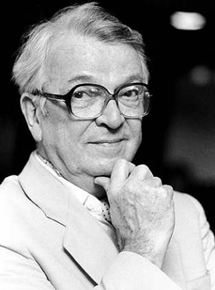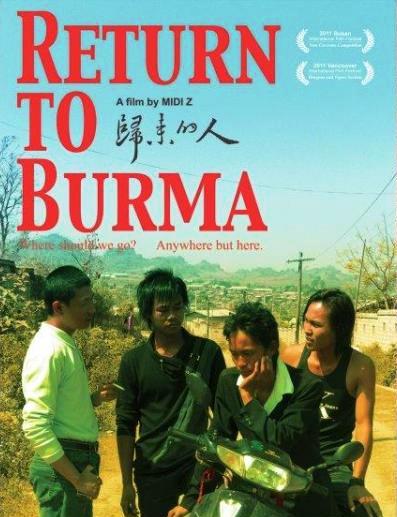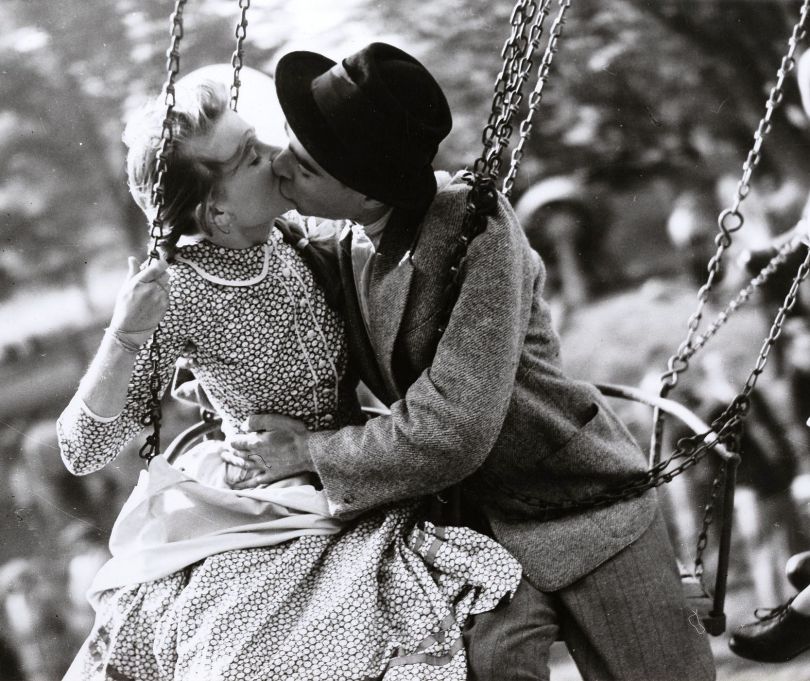|
|
||
|
Pro Tools
FILMFESTIVALS | 24/7 world wide coverageWelcome ! Enjoy the best of both worlds: Film & Festival News, exploring the best of the film festivals community. Launched in 1995, relentlessly connecting films to festivals, documenting and promoting festivals worldwide. Sorry for the disruptions we are working on the platform as of today. For collaboration, editorial contributions, or publicity, please send us an email here. User loginActive Members |
Siraj SyedSiraj Syed is the India Correspondent for FilmFestivals.com and a member of FIPRESCI, the International Federation of Film Critics. He is a Film Festival Correspondent since 1976, Film-critic since 1969 and a Feature-writer since 1970. He is also an acting and dialogue coach. @SirajHSyed  16th Third Eye Asian Film Festival: IV
16th Third Eye Asian Film Festival: IV Screenings continued on Day 4, 5 and 6, and two films were memorable. One was a blast from 1956, made by an all-time great, and the other a laudable 2011 effort, shot in his home country, guerrilla style, by a returning prodigy, without permission I managed to attend nine shows out of the 15, which is a reasonable score. But here I will speak of just two films, since there is much to say. Return to Burma, 2011, 84 min
So now we know that Ice Poison represented the trade-mark Midi style of compassionate, localised and intimate portrayals. But not many would be aware that the film was supposed to be a documentary, and that his non-judgemental style is born out of filming utterly real persons and situations in his own remote, mountainous, small home town in Lashio. It begins with a group of Burmese labourers collecting their wages in Taiwan. Xing-hong is returning home, carrying the ashes of a co-worker, who was from his own home area and died after a fall, working at night, to earn extra money. After two decades of military junta rule, Myanmar holds its first parliamentary election. Xing-hong arrives home to find his brother getting ready to go to work as a labourer in Malaysia. As he looks around, without much luck, for business opportunities, in his small home-town, a sense of disillusionment and alienation pervades. It seems as though nothing much, after all, has changed. Mostly shot guerrilla-style in Myanmar, without official permission, Midi Z’s directorial debut feature, symbolises the filmmaker’s personal homecoming in 2008, ten years after he moved to Taiwan to pursue an education and career. Born and raised in Myanmar, Z, now 35, received a scholarship at the age of 16, to attend high school in Taiwan. He later earned a Bachelor’s degree in Industrial and Commercial Design, at the National Taiwan University of Science and Technology. In order to meet his expenses, Z worked as a construction worker, chef, graphic designer, photographer, and commercial director. So far, he has made three features. Poor Folk (2012) is the one that is missing from this festival. Midi admits that like the woman in Ice Poison (see my earlier post) he would have become a drug dealer, had he not got the break to go to Taiwan. Wang Shin-Hong, the lead actor in Return to Burma, was the production manager who had to be cast as the lead actor since Midi could not find anybody else willing to work in such a dangerous project. Denied permission to shoot the scripts (rejected), Midi’s crew shot the film pretending to be tourists. Long takes, bare, soft sound-track, many pauses and very few close-ups are his signature traits. Very rarely do we see faces, or lips moving, when the character is speaking. With just three films to his name, Midi Z is a director with great promise. Rating: *** *In 1989, the official name of the country was changed from Burma to Myanmar. Almost entirely restricted to Asian cinema, TEAFF has included three films from the Hungarian master, Zoltán Fábri', in a section called European Connection/Centenary Tribute. (Fábri was born in 1917, 100 years ago). As mentioned in an earlier post, I opted out of a screening of Two Half Times in Hell (1961), which I had seen in the 1970s, but not because I did not want to see it again--rather, because there was a pressing commitment clashing. But I did manage to watch Merry Go Round (mis-spelt Marry Go Round in the programme) a 1956 film that was way ahead of its times. Merry Go Round (Korhinta), 1956, 90 min Six decades after the 1956 Cannes Film Festival, ‘Merry-Go-Round' returned to the Cannes in 2007. It was screened in the Cannes Classics section on the occasion of the festival’s 70th anniversary. Back in 1956, a very young French film critic, none other than François Truffaut (who was to become a great film-maker himself), sparked off a minor revolution in protest against the film not having been awarded the Palm d’Or. Zoltán Fábri (1917-94) started his career as a painter. He later trained as an actor and a drama director. His first films were Storm (1951) and Fourteen Lives Saved (1952). In 1953, Hungarian farmers were able to choose whether to farm individually or to stay within the kolkhozes (co-operatives). Merry Go Round, made n 1955-56, is set in 1953 and based on Imre Sarkadi’s short story. Although the main thrust of the story was the impact of the co-operative farming movement n small farmers, Fábri shifted the emphasis from social issues to the individual fates of the lead actors. For the first time in Hungarian film history--until then based on dialogue and verbal narrative--vision, rhythm, montage and unusual angles made a breakthrough and earned worldwide critical acclaim. Fábri’s montage and his clever play with predictability/unpredictability serve as text-book lessons for generations since 1956. Here are some amazing facts from the Hungarian National Film Fund, written by Eszter Fazekas: Consisting of 77 cuts, the dance that the lovers perform at a wedding party that the village-folk are attending, publicly owning up to their revolt, has become iconic in Hungarian cinema. Their liberated Csárdás (also spelt Czárdás, Hungarian Folk Dance; in round, rotating style) is in contrast to the petrified outside world. Ever-tightening shots highlight the shocked groom’s hands as he clings to his glass, the father’s menacing expression and the mother’s anxious face. The long shots are also counterpointed by close-ups of the dancers. When the happiness montage of the merry-go-round fades in, its image features the girl’s state of consciousness. No one says a word. Fábri’s discovery of Mari Törőcsik (named Mari in the film), then only a second-year college student, and the marvellous way in which he guided the actors, are ample evidence of his talent.
Mari Törőcsik remembers her co-actor, Imre Soós, who played the lover, “Even the very best actors are only ‘talented’ at the beginning of their careers; it is through their life and experience that they become great. I knew a single wonderful exception, Imre Soós, who all at once knew everything from the word 'go'.” The French papers that reported from Cannes called Soós the “Hungarian Gérard Philipe”. François Truffaut set up a ranking of his own, and, besides awarding the Palm d’Or to the film, he would have also awarded the Best Actress award to the 20-year-old who had just featured in her first film. Törőcsik was eventually officially awarded the prize twenty years, later for her performance in ‘Mrs. Dery Where Are You?’ (1976). Due to the serious damage that the camera negative had suffered, as well as its resulting deficiencies, the real beauty of the film has only been able to be recovered through the present digital restoration, the works of which took four months in the Hungarian Film Lab. Rating: **** TEAFF is organised by the Asian Film Foundation and P.L. Deshpande Maharashtra Kala Academy, and co-organised by Prabhat Chitra Mandal and Akhil Bharatiya Marathi Chitrapat Mahamandal. It is supported by Department of Culture, Government of Maharashtra. Screenings are held at Ravindra Natya Mandir Mini Auditorium, Mumbai. 27.12.2017 | Siraj Syed's blog Cat. : Ambiance Asian Film Foundation Burma cannes Csárdás Eszter Fazekas Fourteen Lives Saved François Truffaut Gérard Philipe Hungarian National Film Fund Hungary Ice Poison Imre Sarkadi Imre Soós Korhinta malaysia Mari Törőcsik Merry Go Round Midi Z Mrs. Dery Where Are You? Myanmar National Taiwan University of Science and Technology Poor Folk Prabaht Chitra Mandal Ravindra Natya Mandir Return to Burma storm Taiwan Wang Shin-Hong Zoltan Fabri
|
LinksThe Bulletin Board > The Bulletin Board Blog Following News Interview with EFM (Berlin) Director
Interview with IFTA Chairman (AFM)
Interview with Cannes Marche du Film Director
Filmfestivals.com dailies live coverage from > Live from India
Useful links for the indies: > Big files transfer
+ SUBSCRIBE to the weekly Newsletter DealsUser imagesAbout Siraj Syed Syed Siraj Syed Siraj (Siraj Associates) Siraj Syed is a film-critic since 1970 and a Former President of the Freelance Film Journalists' Combine of India.He is the India Correspondent of FilmFestivals.com and a member of FIPRESCI, the international Federation of Film Critics, Munich, GermanySiraj Syed has contributed over 1,015 articles on cinema, international film festivals, conventions, exhibitions, etc., most recently, at IFFI (Goa), MIFF (Mumbai), MFF/MAMI (Mumbai) and CommunicAsia (Singapore). He often edits film festival daily bulletins.He is also an actor and a dubbing artiste. Further, he has been teaching media, acting and dubbing at over 30 institutes in India and Singapore, since 1984.View my profile Send me a message The Editor |















